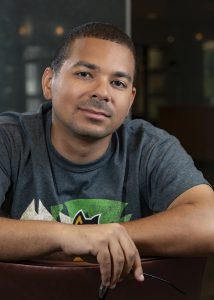
Carl Foster, a graduate educational leadership student, is set to graduate from Wright State after years of hard work.
Carl Foster’s walk across the stage at Wright State University’s fall commencement ceremony will mark the culmination of a long, difficult journey that included the foster care system, homelessness and a lack of family support.
But he persevered and looks forward to the next part of his life’s journey — helping young people who are facing the same challenges he did.
Foster will receive a master’s degree in educational leadership at Wright State’s commencement ceremony for graduate students on Friday, Dec, 15. at 7 p.m. in the Wright State University Nutter Center.
He also earned a bachelor’s degree in sociology from Wright State in 2015. He had been on track to receive his master’s degree in 2017, but, as he says of that time, “I was going through a lot of things mentally.”
Foster’s story starts in his native Pontiac, Michigan, north of Detroit, where he was born to a single teenage mother. He faced many challenges growing up, including poverty and family issues.
He and his mother moved often during his childhood, eventually living in Los Angeles, where his mother wanted to be close to her mother who had become ill. But because of family challenges, he then moved to Columbus when he was 16.
Foster was placed in a group home and lived in various residential facilities under Children Services until he was 18. During that time, he dropped out of high school and worked for various restaurants.
When he was 20, he moved to Dayton to go into Job Corps and earned a GED diploma and a culinary arts certificate.
“I wasn’t thinking about going to college,” Foster said.
But he received help with housing and completing paperwork for college admissions through the staff at Job Corps. He lived within walking distance of Sinclair Community College, so he enrolled there and earned an associate degree in hospitality management to align with his culinary studies.
For his next step, Wright State beckoned.
“Wright State is on a bus line with a stop right in front of where I lived. I wanted to continue going to college, to go further because I wanted a career,” he said.
His academic career progressed and then he hit a rough patch a semester away from the master’s degree for which he was on track in 2017.
“I ended up working in a job that was kind of in my field,” he said.
Foster worked for Job Corps – where he had been years before – as a resident advisor. He connected with young people at Job Corps, using his testimony, education and experiences to reach the students.
During the pandemic, he moved on to other jobs, but he said they were dead ends. In 2020, he re-enrolled at Wright State to finish his master’s degree, which he is poised to receive at the commencement ceremony for graduate students on Friday, Dec, 15. at 7 p.m. in the Wright State University Nutter Center.
Today, Foster is a success coach at Dayton Public Schools. He helps students and often empathizes with their circumstances because he lived in similar situations when he was their age.
“So when I talk to the students, I have a great deal of empathy,” said Foster.
Foster believes he understands the problems some people face because, he said, “some study it, some lived it, and I’ve done both.”
Foster’s accomplishments have been noted and encouraged by Carol Logan Patitu, Ph.D., professor and chair of the Department of Leadership Studies in Education and Organizations and director of Student Affairs in Higher Education Master’s Program and Sports Management Certificate Program.
“It has been a joy working with Carl, who is caring, humble, and hardworking,” she said. “He has been a phenomenal student who is wholeheartedly committed to helping others. He will be a great role model for foster children and all students going into higher education.”
Foster does not expect anyone from his far-flung family to attend the commencement ceremony.
“But a lot of people who I met in school will cheer me on — Job Corps, Sinclair, Wright State,” he said. “Those are who I expect to be there.”
He has a specific goal in mind for what comes next.
“I’m looking into a position to put me on the pathway to becoming a high school principal,” he said. “If that means becoming a counselor or substitute teaching, whatever pathway to be a principal or work for a college with programs like Upward Bound and ISN— Independent Scholar Network — as a coordinator or director.”

 Wright State celebrates homecoming with week-long block party
Wright State celebrates homecoming with week-long block party  Wright State baseball to take on Dayton Flyers at Day Air Ballpark April 15
Wright State baseball to take on Dayton Flyers at Day Air Ballpark April 15  Wright State joins selective U.S. Space Command Academic Engagement Enterprise
Wright State joins selective U.S. Space Command Academic Engagement Enterprise  Glowing grad
Glowing grad  Wright State’s Homecoming Week features block party-inspired events Feb. 4–7 on the Dayton Campus
Wright State’s Homecoming Week features block party-inspired events Feb. 4–7 on the Dayton Campus 